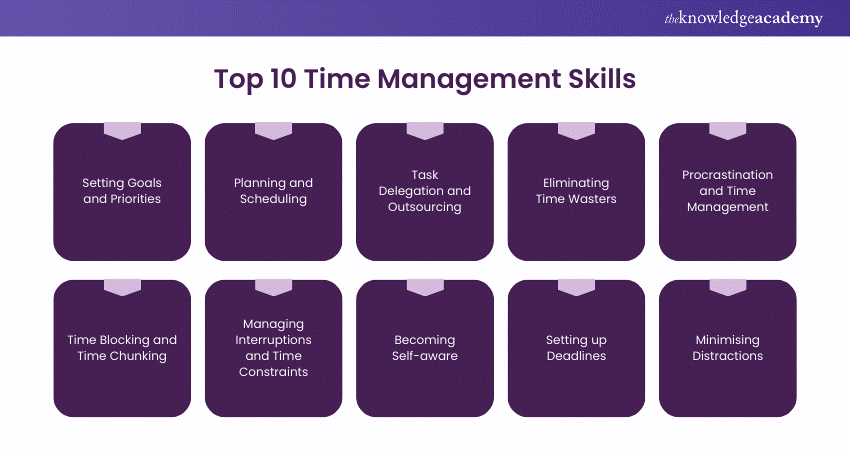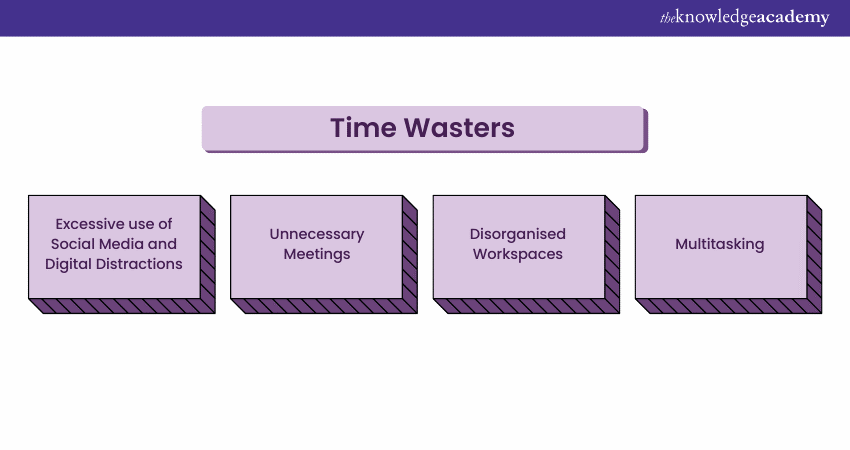We may not have the course you’re looking for. If you enquire or give us a call on +44 1344 203999 and speak to our training experts, we may still be able to help with your training requirements.
We ensure quality, budget-alignment, and timely delivery by our expert instructors.

Imagine starting your day with a clear plan, only to find yourself overwhelmed by midday. Does this sound familiar? But effective Time Management Skills can transform such chaotic days into productive ones. By prioritising tasks and setting realistic goals, individuals can complete their work efficiently and enjoy more free time.
This blog will talk about practical strategies to enhance your Time Management Skills, help you manage your time better, lessen stress, and increase productivity. Ready to take control of your schedule and make the most of each day? Let's dive into the world of Time Management and discover the tools you need to succeed.
Table of Contents
1) What are Time Management Skills?
2) Why are Time Management Skills important?
3) Top 10 Time Management Skills
4) How to Improve Your Time Management Skills?
5) What are Three Examples of Time Management Skills?
6) Conclusion
What are Time Management Skills?
Time Management Skills Guide refers to a set of abilities and practices that help individuals use their time efficiently. This approach helps to boost productivity and achieve your goals.
Moreover, by mastering these skills and understanding the Principles of Time Management, you can make better and more informed decisions in the complexities of allocating time. This ensures that you can focus on what matters most and maintain a healthy work-life balance.

Why are Time Management Skills important?
Time Management Skills are important for gaining both personal as well as professional success. It offers multiple benefits for enhancing productivity, reducing stress, and elevate overall well-being. Here are the key reasons why developing Time Management Skills is so useful:
1) Reduced Stress: Proper Time Management minimises the likelihood of feeling stressed by tight deadlines and commitments assigned by the organisations to their employees. When tasks are organised and planned in the right way, individuals can experience fewer anxiety levels and are able to approach their work with a clear and focused mindset.
2) Improved Focus and Concentration: Time Management cultivates discipline, helping individuals stay focused on tasks without succumbing to distractions. Concentration levels are heightened by setting specific time slots for activities and eliminating unnecessary interruptions, leading to better quality work.
3) Goal Achievement: Effective Time Management facilitates progress towards long-term goals. By breaking down objectives into manageable tasks and allocating time towards their completion, individuals can steadily work towards achieving their aspirations.
4) Opportunity Maximisation: Time Management enables individuals to seize opportunities as they arise. By efficiently managing their schedules, individuals can make room for new ventures, networking opportunities, and personal growth.
5) Professional Reputation: Professional reputation is reflected in a positive way by meeting deadlines consistently and gaining the ability to deliver high-quality work.
6) Adaptability: Effective Time Management develop adaptability within an individual during the course of unexpected challenges and changes. Individuals who have the relevant Time Management Skills are better equipped to adjust their schedules and priorities to accommodate unforeseen circumstances.
10) Long-term Success: Mastering Time Management stands as a cornerstone of long-term success. By cultivating discipline, organisation, and efficiency, individuals can position themselves to drive sustained growth, achievement, and fulfilment in their personal and professional lives.
Ready to take your time and use it effectively, refer to our blog on Time Management Books.
Top 10 Time Management Skills
Mastering these skills not only helps improve productivity but also strengthens one’s professional standing. This section of the blog will help you understand the different Time Management Skills to enhance your efficiency and elevate your performance:

1) Setting goals and priorities
Setting goals and priorities is a crucial prospect for effective Time Management. By gaining proficiency in Time Management Skills, individuals can effectively dedicate their time and energy towards activities that align with their goals. This can be achieved by defining specific objectives and determining their relative importance.
When setting goals, it's important to follow the SMART approach, which stands for Specific, Measurable, Achievable, Relevant, and Time-bound:
a) Specific: Goals should always provide clarity and direction within themselves
b) Measurable: Goals should allow for effective tracking of progress
c) Achievable: Goals should be realistic, meaning, you should be thoroughly aware of your abilities and resources.
d) Relevant: Goals should align with one's values and long-term aspirations
e) Time-bound: Goals should have clear deadlines. It should provide enough time for urgency so the individual constantly works towards them.
Prioritising tasks is equally important. Not all tasks are equally important or urgent. Therefore, allocating the right time to each task is the key to success. It involves identifying critical tasks that directly contribute to goal accomplishment and giving them precedence for them.
Effective strategies for setting goals and priorities include defining clear objectives, breaking goals into manageable milestones, and evaluating their importance and urgency. Additionally, considering long-term vision, allocating resources, learning to say “no”, and regularly reviewing and adjusting priorities are crucial.
2) Planning and Scheduling
Planning and scheduling are the two critical components of effective Time Management. They involve creating a roadmap for accomplishing tasks and allocating time for each activity.
When it comes to planning, it is important to start with a clear understanding of the tasks that need to be accomplished. This involves breaking down bigger tasks into smaller steps. By defining the specific actions required, you can create a structured plan that highlights what needs to be done, when, and how.
Scheduling, on the other hand, mainly covers allocating time slots for each task within the overall plan. This approach helps you prioritise activities, manage workload, and ensure that essential tasks are completed as per a well-defined schedule. Scheduling also allows for better Time Management by visually representing how time should be allocated throughout the day or week.
3) Task Delegation and Outsourcing
Task delegation and outsourcing are valuable strategies for effective Time Management. They involve assigning tasks to others or seeking external help to lighten your workload and free up most of your schedule for more important or high-priority activities.
Delegation is defined as the process of assigning tasks to individuals within your team or organisation who have the necessary skills and capabilities to complete them. This approach allows you to distribute workload, leverage the strengths of others, and foster collaboration.
Outsourcing, on the other hand, involves seeking external assistance or hiring third-party experts or service providers to handle specific tasks or projects. This can be particularly beneficial when tasks require specialised skills, resources, or expertise that may not be readily available within your organisation.
Ready to boost your productivity and master Time Management? Join our Productivity and Time Management Course today!
4) Eliminating Time Wasters
Eliminating time wasters is a critical step towards effective Time Management. Time wasters are activities or habits that consume valuable time without contributing significant value or progress towards goals. By identifying and eliminating these, individuals can enhance productivity and focus on essential tasks.
Here are some critical time wasters and strategies to eliminate them:

a) Excessive use of Social Media and Digital Distractions: Endlessly scrolling through social media or browsing online can consume a substantial amount of time. Setting boundaries, such as allocating specific slots for social media or using website blockers, is highly important to minimise these distractions.
b) Unnecessary Meetings: Assess the importance and relevance of each meeting invitation before accepting it. See whether the objectives can be achieved through alternative means, such as email communication, brief updates, or personal meetings is an urgency.
c) Disorganised Workspaces: Disorganised workspaces can lead to a lot of time wastage, for instance, by searching for documents or supplies. Adopting effective organisational systems and keeping a tidy workspace can save time and enhance efficiency. These include decluttering and using digital tools for file management.
d) Multitasking: Despite its perceived productivity, multitasking often leads to reduced focus and work quality. By embracing single-tasking, focusing on one task at one time and completing it before moving on to the next, you can save plenty of time. Furthermore, this approach improves concentration and overall productivity.
5) Procrastination and Time Management
Procrastination is a typical challenge that is encountered by individuals to manage their time in an effective way. It refers to the delaying or postponing tasks, often opting for short-term pleasure or comfort over long-term productivity.
Procrastination often arises due to various reasons. These include fear of failure, perfectionism, or feeling overwhelmed by the task at hand.
Transform your focus skills with Attention Management techniques- Join our Attention Management Training today!
6) Time Blocking and Time Chunking
Time blocking and time chunking are effective techniques for managing and optimising time. They involve scheduling specific blocks or chunks of time dedicated to particular tasks or activities. By implementing these strategies, individuals can enhance focus, improve productivity, and make the most of their available time.
Time blocking involves allocating dedicated time slots for different tasks, projects, or activities throughout the day. It is a key technique in Attention Management, helping to create a structured schedule and ensuring that important tasks receive dedicated attention.
Time chunking, on the other hand, mainly covers grouping similar tasks or activities together within a specific time frame. Instead of switching between different types of tasks randomly, individuals allocate a set period for specific activities. For example, grouping all email-related tasks into one chunk of time or dedicating a specific block for creative work.
7) Managing Interruptions and Time Constraints
Managing interruptions and time constraints is among the two most critical parameters for managing time effectively. Interruptions can disrupt your workflow, leading to decreased productivity and difficulty in staying focused on important tasks. If you are aiming to minimise interruptions, it is crucial to identify familiar sources of disruptions and perform proactive measures to mitigate their impact.
Setting clear communication boundaries, such as communicating availability to colleagues or family members, is also vital. It can help minimise unnecessary interruptions. Additionally, allocating specific blocks for focused work and communicating unavailability during these periods can reduce the likelihood of interruptions.
8) Becoming Self-aware
Understanding oneself lays the foundation to manage time effectively. By reflecting on personal work habits, energy levels, and distractions, individuals can tailor their schedules for better productivity.
For instance, someone might realise they have the best productivity in the morning. As a result, tackling complex tasks becomes a lot easier, in contrast to those who find their focus peaks in the afternoon. Recognising these patterns allows individuals to allocate tasks accordingly, ensuring they maximise their peak productivity hours.
9) Setting up Deadlines
Deadlines provide structure and motivation, helping people prioritise tasks and work more efficiently. Whether set by oneself or others, deadlines create a sense of urgency that pushes individuals to focus and make robust progress towards their goals. Breaking larger projects into smaller, manageable deadlines helps track progress and maintain momentum.
Setting realistic deadlines is key for effective Time Management. Unrealistic deadlines can cause stress, burnout, and poor-quality work. By accurately estimating the time needed for each task and allowing extra time for delays, individuals can set achievable deadlines that lead to success.
10) Minimising Distractions
Distractions are among the most common obstacles to productivity. This often leads to wasted time and minimised focus. By reducing distractions, you can not only maintain productivity but also stay on track with tasks at a constant time.
One effective strategy to inhibit these distractions is by creating a workspace that is free from any kind of interruptions and provides you the positive vibes, such as your bedroom or patio. This can also include setting up a quiet area away from high-traffic areas or using noise-cancelling headphones to block out any kind of excessive external noise.
Build resilience with advanced Stress Management strategies- sign up for our Stress Management Course today!
How to Improve Your Time Management Skills?
You can severely improve your Time Management skills by boosting your productivity and reducing a vast level of stress. Here are seven key tips to help you manage your time not just effectively but efficiently:
1) Produce a Time Log for a Week: Keep a weekly log for yourself. This will help you show and track how much you are currently spending your time on and what non-productive tasks are losing your worth with time. This is especially useful if you are working in a hybrid environment, as it helps you manage your time better.
2) Use the Most Important Matrix to Prioritise Tasks: This matrix helps you focus on the most important and urgent tasks. Such an approach makes sure that your top priorities are addressed in the right way on a most urgent basis.
3) Focus On Important/Urgent Tasks When you are Most Alert: Make sure you tackle high-priority tasks first when you think your attention level is highest, such as in the morning or evening. Through this approach of alternating high and low-attention tasks or taking micro-breaks can allow your brain to recover from demanding and highly challenging tasks.
4) Compile a ‘To-Do’ List Every Day: A daily to-do list helps you track your priorities and progress. This is particularly useful for maintaining self-discipline when working from home.
5) Take Micro-breaks Between Tasks: Short breaks, such as making a coffee or walking around, can reinvigorate you and improve your posture. These breaks ensure you return to your desk with optimum concentration and help limit interruptions from others.
6) Look for Signs of Procrastination and Take Action: Identify why you procrastinate and address the root cause. Avoid distractions like daytime TV, long lunches, and social media, especially when working from home, to prevent falling behind on your tasks.
7) Manage Email Effectively: Turn off email notifications and check emails only two or three times a day. Keep your emails concise and avoid 'Replying to All'. Focus on important tasks first and set aside specific times for responding to emails.
What are Three Examples of Time Management Skills?
Effective Time Management is crucial for minimising productivity and achieving both personal and professional goals. Here are three key examples of Time Management Skills:
1) Planning: This involves creating to-do lists and checklists to organise tasks and ensure nothing is overlooked. It also includes setting thoughtful deadlines and auditing workflows to improve efficiency.
2) Prioritising: This involves evaluating urgent tasks and determining which activities need immediate attention. By filtering notifications and focusing on high-priority tasks, individuals can avoid distractions and ensure critical work is completed on time.
3) Goal Setting: Setting both short along with long-term goals provides direction and motivation. It involves using data to track progress, making adjustments as needed, and utilising automation and technology to streamline processes and reduce manual effort.
Transform your ambitions into results with our Motivation and Goal Setting Training- Register today!
Conclusion
By implementing the Time Management Skills and strategies mentioned in this blog, along with insights from various Time Management Theories, you can optimise your schedule and increase productivity. Time is a precious resource, and understanding the difference between Attention Management and Time Management allows you to optimise both, leading to greater success. How we manage our time shapes our success and overall well-being and lays the foundation for the future. We hope this blog answered all your questions related to Time Management Skills!
Strive to be the better version of yourself with our Personal Development Courses, Sign up today!
Frequently Asked Questions
What Are the Five Keys to Time Management?

The five keys to Time Management are prioritisation, goal setting, planning, delegation, and avoiding procrastination. Each carries its own set of importance. For instance, prioritisation involves focusing on the most critical tasks while avoiding procrastination, which helps to keep you focused and efficient.
What Is the List of Tools for Improving Time Management Habits?

The key list of tools for improving Time Management habits includes task managers like Todoist and Trello, calendar apps like Google Calendar, time trackers like Toggl, focus tools like Pomodoro timers, note-taking apps like Evernote, and goal-setting apps like Habitica.
What are the Other Resources and Offers Provided by the Knowledge Academy?

The Knowledge Academy takes global learning to new heights, offering over 3,000 online courses across 490+ locations in 190+ countries. This expansive reach ensures accessibility and convenience for learners worldwide.
Alongside our diverse Online Course Catalogue, encompassing 19 major categories, we go the extra mile by providing a plethora of free educational Online Resources like News updates, Blogs, videos, webinars, and interview questions. Tailoring learning experiences further, professionals can maximise value with customisable Course Bundles of TKA.
What is The Knowledge Pass, and How Does It Work?

The Knowledge Academy's Knowledge Pass, a prepaid voucher, adds another layer of flexibility, allowing course bookings over a 12-month period. Join us on a journey where education knows no bounds.
What Are Related Courses and Blogs Provided by the Knowledge Academy?

The Knowledge Academy offers various Personal Development Courses, including Time Management Training, Attention Management Training, and Supervisor Training. These courses cater to different skill levels, providing comprehensive insights into What is Emotional Resilience.
Our Business Skills Blogs cover a range of topics related to Time Management, offering valuable resources, best practices, and industry insights. Whether you are a beginner or looking to advance your Time Management skills, The Knowledge Academy's diverse courses and informative blogs have got you covered.
Upcoming Business Skills Resources Batches & Dates
Date
 Time Management Training
Time Management Training
Fri 28th Feb 2025
Fri 7th Mar 2025
Fri 23rd May 2025
Fri 18th Jul 2025
Fri 12th Sep 2025
Fri 14th Nov 2025






 Top Rated Course
Top Rated Course


 If you wish to make any changes to your course, please
If you wish to make any changes to your course, please


